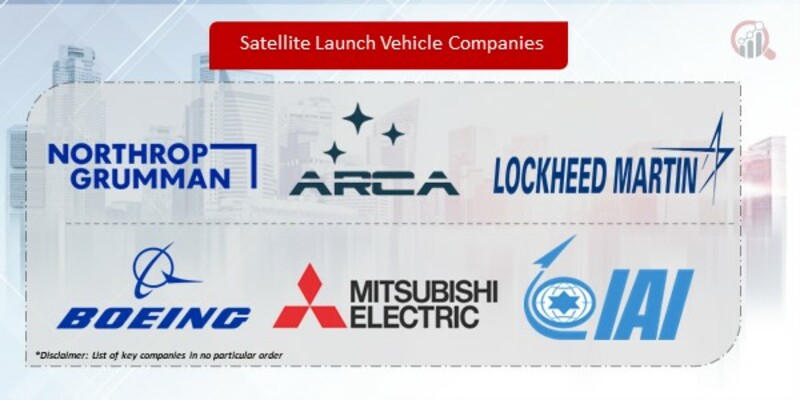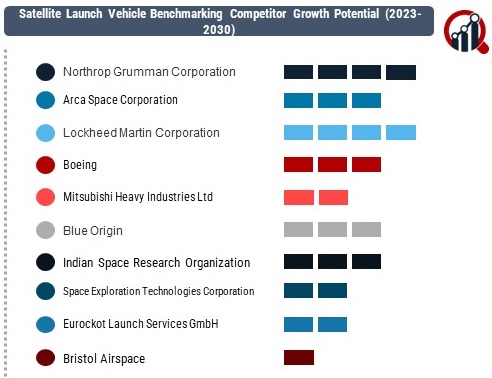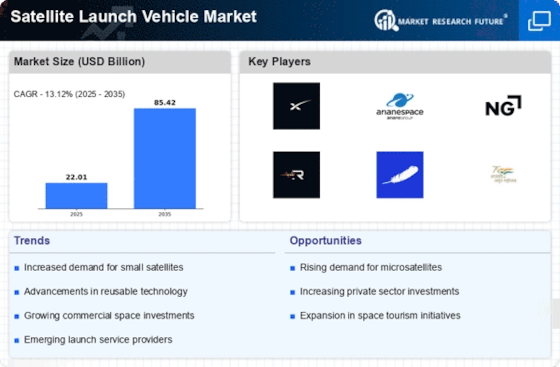Top Industry Leaders in the Satellite Launch Vehicle Market

The competitive landscape of the satellite launch vehicle market is instrumental in shaping the global space industry, facilitating the deployment of satellites for communication, Earth observation, and scientific purposes. Key players in this market employ diverse strategies to navigate challenges and capitalize on the growing demand for reliable and cost-effective satellite launch services.
Key Players:
Northrop Grumman Corporation (US)
Arca Space Corporation (US)
Lockheed Martin Corporation (US)
Boeing (US)
Mitsubishi Heavy Industries Ltd (Japan)
Blue Origin (US)
Indian Space Research Organization (India)
Space Exploration Technologies Corporation (US)
Eurockot Launch Services GmbH (Germany)
Bristol Airspace (UK)
Kelly Space & Technology Inc. (US)
Virgin Orbit (US)
E-Prime Aerospace (US)
Scaled Composites LLC (US)
Brunswick Corporation
Strategies Adopted:
The satellite launch vehicle market deploy strategic initiatives to address the evolving needs of satellite operators and governments. Notable strategies include continuous investment in research and development, market diversification, strategic partnerships, and a focus on reusability. SpaceX, for instance, has gained prominence by incorporating reusability into its Falcon 9 and Falcon Heavy launch vehicles, reducing launch costs significantly. Arianespace emphasizes market diversification by offering launch services for a wide range of satellites, catering to both commercial and government customers. Strategic collaborations between Roscosmos and international space agencies aim to optimize launch capabilities and foster international cooperation in space exploration.
Market Share Analysis:
The satellite launch vehicle market is influenced by factors such as launch success rates, payload capacity, pricing competitiveness, and the ability to accommodate diverse satellite sizes and mission profiles. Companies excelling in delivering high-quality, reliable launch services, ensuring cost-effectiveness, and offering flexible launch solutions for various satellite types are strategically positioned to capture a larger market share. Establishing strong relationships with satellite manufacturers, operators, and government space agencies is crucial for maintaining a competitive edge in this dynamic and evolving sector.
News & Emerging Companies:
The satellite launch vehicle market has witnessed the emergence of new companies aiming to address the growing demand for innovative and cost-efficient launch solutions. Emerging entrants such as Rocket Lab and Relativity Space have gained attention for their focus on leveraging new technologies, such as 3D printing, to reduce launch costs and increase launch frequency. These emerging companies contribute to the market by introducing fresh perspectives and agile approaches, challenging traditional business models and fostering innovation in the space launch sector.
Industry Trends:
The satellite launch vehicle market underscores ongoing investment trends, with a strong emphasis on reusability, small satellite launch services, and commercial space ventures. Companies are investing significantly in the development of reusable rocket technologies, aiming to reduce launch costs and increase overall operational efficiency. Additionally, there is a growing trend towards catering to the small satellite market, with dedicated launch services for small and microsatellites. Investments in commercial space ventures, such as satellite constellations for global broadband coverage, signify a shift in the industry towards meeting the increasing demand for satellite-based services. These investments reflect the market's commitment to staying at the forefront of technological advancements and addressing the evolving needs of the satellite industry.
Competitive Scenario:
The satellite launch vehicle market is marked by intense competition among established players and the entry of innovative newcomers. With the global space industry experiencing unprecedented growth, companies aim to differentiate themselves by offering reliable, cost-effective, and technologically advanced launch services. Established players focus on refining their launch vehicle capabilities, expanding their market presence through strategic partnerships, and staying informed about emerging satellite technologies and mission requirements. The entry of emerging companies adds dynamism to the market, fostering an environment of continuous improvement and responsiveness to the changing demands of the satellite launch industry.
Recent Development
The satellite launch vehicle market witnessed a significant development as Blue Origin successfully launched its New Glenn rocket for the first time, marking a major milestone for the company. The New Glenn rocket, designed to carry large payloads into orbit, represents Blue Origin's entry into the heavy-lift launch market. The successful inaugural launch demonstrates Blue Origin's commitment to expanding its presence in the satellite launch sector and competing in the heavy-lift launch category. This development is anticipated to have a significant impact on the overall competitive landscape, introducing a new player with capabilities to handle large satellite payloads. The successful launch reaffirms Blue Origin's position as a key player in the evolving market of space launch services and highlights the industry's continuous efforts to broaden launch capabilities to accommodate diverse mission requirements.











